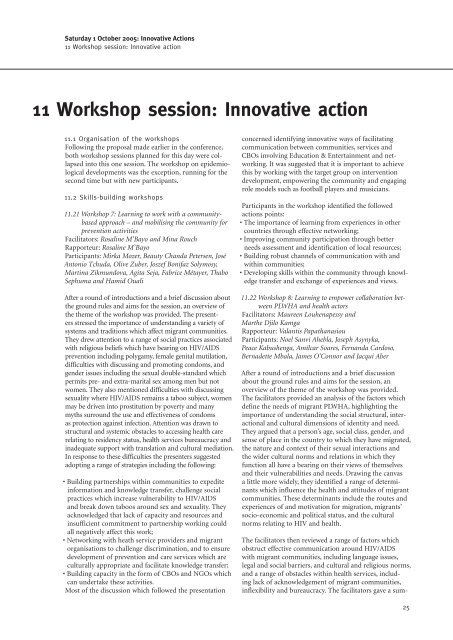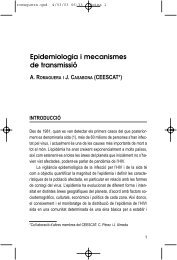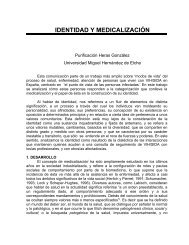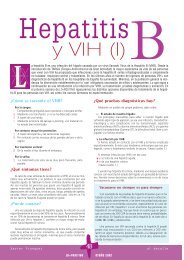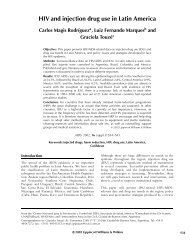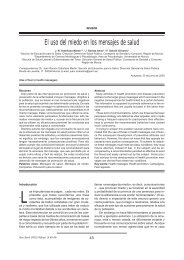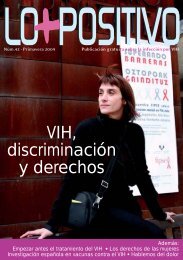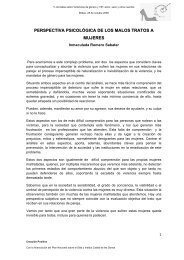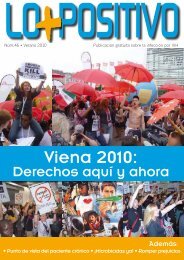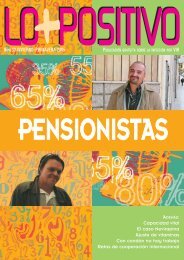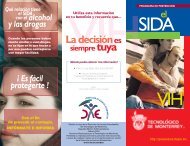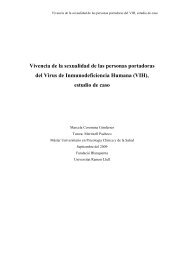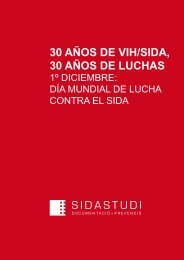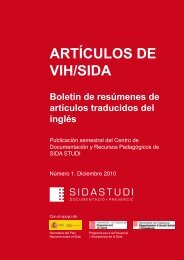Report - Sida Studi
Report - Sida Studi
Report - Sida Studi
You also want an ePaper? Increase the reach of your titles
YUMPU automatically turns print PDFs into web optimized ePapers that Google loves.
Saturday 1 October 2005: Innovative Actions<br />
11 Workshop session: Innovative action<br />
11 Workshop session: Innovative action<br />
11.1 Organisation of the workshops<br />
Following the proposal made earlier in the conference,<br />
both workshop sessions planned for this day were collapsed<br />
into this one session. The workshop on epidemiological<br />
developments was the exception, running for the<br />
second time but with new participants.<br />
11.2 Skills-building workshops<br />
11.21 Workshop 7: Learning to work with a communitybased<br />
approach – and mobilising the community for<br />
prevention activities<br />
Facilitators: Rosaline M’Bayo and Mina Rouch<br />
Rapporteur: Rosaline M’Bayo<br />
Participants: Mirka Mozer, Beauty Chanda Petersen, José<br />
Antonio Tchuda, Olive Zuber, Joszef Bonifaz Solymosy,<br />
Martina Zikmundova, Agita Seja, Fabrice Métayer, Thabo<br />
Sephuma and Hamid Ouali<br />
After a round of introductions and a brief discussion about<br />
the ground rules and aims for the session, an overview of<br />
the theme of the workshop was provided. The presenters<br />
stressed the importance of understanding a variety of<br />
systems and traditions which affect migrant communities.<br />
They drew attention to a range of social practices associated<br />
with religious beliefs which have bearing on HIV/AIDS<br />
prevention including polygamy, female genital mutilation,<br />
difficulties with discussing and promoting condoms, and<br />
gender issues including the sexual double-standard which<br />
permits pre- and extra-marital sex among men but not<br />
women. They also mentioned difficulties with discussing<br />
sexuality where HIV/AIDS remains a taboo subject, women<br />
may be driven into prostitution by poverty and many<br />
myths surround the use and effectiveness of condoms<br />
as protection against infection. Attention was drawn to<br />
structural and systemic obstacles to accessing health care<br />
relating to residency status, health services bureaucracy and<br />
inadequate support with translation and cultural mediation.<br />
In response to these difficulties the presenters suggested<br />
adopting a range of strategies including the following:<br />
• Building partnerships within communities to expedite<br />
information and knowledge transfer, challenge social<br />
practices which increase vulnerability to HIV/AIDS<br />
and break down taboos around sex and sexuality. They<br />
acknowledged that lack of capacity and resources and<br />
insufficient commitment to partnership working could<br />
all negatively affect this work;<br />
• Networking with heath service providers and migrant<br />
organisations to challenge discrimination, and to ensure<br />
development of prevention and care services which are<br />
culturally appropriate and facilitate knowledge transfer;<br />
• Building capacity in the form of CBOs and NGOs which<br />
can undertake these activities.<br />
Most of the discussion which followed the presentation<br />
concerned identifying innovative ways of facilitating<br />
communication between communities, services and<br />
CBOs involving Education & Entertainment and networking.<br />
It was suggested that it is important to achieve<br />
this by working with the target group on intervention<br />
development, empowering the community and engaging<br />
role models such as football players and musicians.<br />
Participants in the workshop identified the followed<br />
actions points:<br />
• The importance of learning from experiences in other<br />
countries through effective networking;<br />
• Improving community participation through better<br />
needs assessment and identification of local resources;<br />
• Building robust channels of communication with and<br />
within communities;<br />
• Developing skills within the community through knowledge<br />
transfer and exchange of experiences and views.<br />
11.22 Workshop 8: Learning to empower collaboration between<br />
PLWHA and health actors<br />
Facilitators: Maureen Louhenapessy and<br />
Marthe Djilo Kamga<br />
Rapporteur: Valantis Papathanasiou<br />
Participants: Noel Sanvi Ahebla, Joseph Asynyka,<br />
Peace Kabushenga, Amílcar Soares, Fernanda Cardoso,<br />
Bernadette Mbala, James O’Connor and Jacqui Aber<br />
After a round of introductions and a brief discussion<br />
about the ground rules and aims for the session, an<br />
overview of the theme of the workshop was provided.<br />
The facilitators provided an analysis of the factors which<br />
define the needs of migrant PLWHA, highlighting the<br />
importance of understanding the social structural, interactional<br />
and cultural dimensions of identity and need.<br />
They argued that a person’s age, social class, gender, and<br />
sense of place in the country to which they have migrated,<br />
the nature and context of their sexual interactions and<br />
the wider cultural norms and relations in which they<br />
function all have a bearing on their views of themselves<br />
and their vulnerabilities and needs. Drawing the canvas<br />
a little more widely, they identified a range of determinants<br />
which influence the health and attitudes of migrant<br />
communities. These determinants include the routes and<br />
experiences of and motivation for migration, migrants’<br />
socio-economic and political status, and the cultural<br />
norms relating to HIV and health.<br />
The facilitators then reviewed a range of factors which<br />
obstruct effective communication around HIV/AIDS<br />
with migrant communities, including language issues,<br />
legal and social barriers, and cultural and religious norms,<br />
and a range of obstacles within health services, including<br />
lack of acknowledgement of migrant communities,<br />
inflexibility and bureaucracy. The facilitators gave a sum-<br />
25


